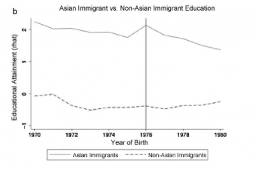Study finds some children born in the year of the dragon have an advantage

As Chinese New Year approaches, Many East-Asian families hope that their children will be born in this Year of the Dragon because of the belief that the child will be smarter and more prosperous than children born during the other 11 Chinese Zodiac years. A study by two George Mason University economics professors, Noel D. Johnson and John V.C. Nye, suggests there may be some truth to the superstition, but the reasons have little to do with luck.
Published in the Journal of Economic Behavior & Organization in January 2011, the study finds Asian immigrants to the United States born in the 1976 Year of the Dragon are more educated than comparable immigrants from non-dragon years. Asian-American “dragon babies” born in 1976 have on average 0.34 years more education than Asians born in non-dragon years. When only comparing Asian immigrant dragon babies to Asian immigrants born in other years, the advantage increases to about half a year of education. In contrast, no advantage is noticeable for children in the general U.S. population born in a Year of the Dragon.
The authors also found that this benefit may have more to do with the parents than sheer luck. Children born in the 1988 or 2000 dragon years have mothers who are more educated, wealthier and older than non-Asian mothers of dragon-year babies. The differences are especially strong for mothers with only one child, according to the study. The educational advantage of “dragon children” is likely due to the care and planning of the parents, rather than the year they were born, the authors suggest.
“Belief in the superiority of dragon-year children is self-fulfilling,” says John Nye, professor of economics. “The demographic characteristics associated with parents who are more willing and able to adjust their birthing strategies are correlated with greater investment in their children.”
“When these investments pay off, the educational success of the dragon children lends support to the superstition, reinforcing the belief of another generation of parents to plan to have children in the Year of the Dragon,” says Noel Johnson, assistant professor of economics. “This is an excellent illustration of how, seemingly irrational beliefs, can often be explained using the tools of economics once one looks a little closer.”
To compile the study, the authors used U.S. Census data from 2000 and Current Population Surveys of the U.S. Bureau of the Census and the Bureau of Labor Statistics from 2000, 2002, 2004, 2006 and 2008. The researchers plan to investigate further results of the “dragon baby” advantage as new census data emerges.
In the past few "dragon years," Asian leaders have cautioned citizens on creating a baby boom for fear of the strain it would put on public resources. This year, however, Taiwan's President Ma Ying-jeou and Singapore’s Prime Minister Lee Hsien Loong have both called for a "dragon baby boom" to help ease population shortages in their respective countries.
The authors found no population spike in dragon years before 1976 and, even after 1976, there is no evidence for a dragon year fertility spike in the People’s Republic of China, likely due to government restrictions on the number of children a family can have.
The authors note that in the United States there is unlikely to be any overall population boom in the 2012 Year of the Dragon since the majority of the population does not believe in the superstition.
Provided by George Mason University




















